|
|
|
Sort Order |
|
|
|
Items / Page
|
|
|
|
|
|
|
| Srl | Item |
| 1 |
ID:
166317
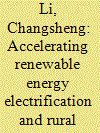

|
|
|
|
|
| Summary/Abstract |
The rural developing world faces a significant challenge in achieving the dual objectives of economic growth and decarbonization. An innovative business model tested in China that combines the use of solar photovoltaics (PVs) and agricultural greenhouses offers a solution to meeting this challenge and can have the potential for global deployment. However, the traditional PV-greenhouse business model is facing growing difficulties with shrinking revenues due to declining feed-in-tariffs. This study discusses a new business model concept based on a case in which a local Chinese PV company has transformed its business model from a crop production business to a service platform. The study concludes that business model innovation for expanding PV-greenhouse functions can help PV agricultural companies effectively adapt their businesses to policy changes and that new supporting policies are needed in promoting PV-greenhouse integration, adopting financial supporting measures, and facilitating grid integration of PV.
|
|
|
|
|
|
|
|
|
|
|
|
|
|
|
|
| 2 |
ID:
132692
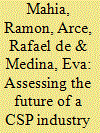

|
|
|
|
|
| Publication |
2014.
|
| Summary/Abstract |
This article presents the results of a survey on the feasibility of, and difficulties in, establishing a locally CSP manufacturing industry in Morocco. First, the survey explores which specific components of the CSP production chain could be manufactured in Morocco today and which would require moderate or significant changes being made in that country over the next decade. This paper contributes to demonstrating the potential for a CSP manufacturing industry in Morocco at the present time, ideal business models and current restrictions. Second, on the one hand this survey provides insight into the entrepreneurial, policy- and market-related barriers hampering the development of this industry and, on the other, the relative advantages offered by Morocco for the development of a CSP sector. Complementing the empirical findings on foreign direct investment determinants, this exercise stresses the key relevance of the economic context not only in terms of size, stability and predictability of the market, but also in regard to the critical importance of institutional and policy-related issues such as stability and public policy commitment. The results show that prior experience of firms in developing areas is a crucial issue in the accurate assessment of the risks and benefits associated with FDI decisions
|
|
|
|
|
|
|
|
|
|
|
|
|
|
|
|
| 3 |
ID:
150741
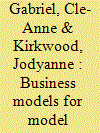

|
|
|
|
|
| Summary/Abstract |
Against the background of mounting research suggesting entrepreneurship as a means of increasing the uptake of renewable energy technologies (RETs) in developing countries, this paper presents the findings of an exploratory investigation into the business models used by renewable energy entrepreneurs in such countries. Forty-three entrepreneurs were interviewed in 28 developing countries and secondary information about country and regional conditions was analysed. We chose the Business Model Canvas as an analytical tool and the findings shed new light on established renewable energy business types. Three different types of businesses were identified – Consultants, Distributors, and Integrators; yet, there is also some overlap between these types. These business types appeared to parallel the life cycle progression of the business, but this requires further research. A key component of the study was to assess whether the types of businesses were related to country-level conditions to assess the impact of regional differences. These comparisons revealed consistencies between country-level characteristics and the entrepreneurs’ choice of business model. Conclusions suggest that different regions may support certain business models more than others due to differing levels of government interest in renewables, governance and policy support and the relative ease of doing business.
|
|
|
|
|
|
|
|
|
|
|
|
|
|
|
|
| 4 |
ID:
180117
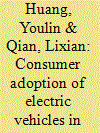

|
|
|
|
|
| Summary/Abstract |
Electric vehicles (EVs) are one of the major green technologies, and existing literature has extensively examined consumer adoption of EVs in an EV-buying business model. By contrast, little attention has been paid to consumers' adoption of EVs in non–ownership-based business models. To fill this literature gap, this study examines the psychological antecedents to, and influencing mechanism for, consumers to adopt EVs in different business models. Using time-lagged design, we show that need for uniqueness (NFU) trait enhances consumers' psychosocial view of EVs. This in turn promotes consumers' intention to adopt EVs in innovative business models such as EV leasing and business-to-consumer EV sharing. We further find that risk aversion negatively affects intention to adopt EVs in innovative business models only. Furthermore, consumers' intention to adopt EVs in innovative business models is positively associated with their intention to buy EVs. Moving beyond the EV-buying business model, we contribute to the sustainable innovation literature by exploring the psychological antecedents to, and mediator of, the psychosocial view in consumers’ adoption of EVs in different business models. Our work has significant value for green marketing and public policies of sustainable innovations.
|
|
|
|
|
|
|
|
|
|
|
|
|
|
|
|
| 5 |
ID:
128352
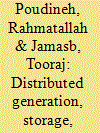

|
|
|
|
|
| Publication |
2014.
|
| Summary/Abstract |
The need for investment in capital intensive electricity networks is on the rise in many countries. A major advantage of distributed resources is their potential for deferring investments in distribution network capacity. However, utilizing the full benefits of these resources requires addressing several technical, economic and regulatory challenges. A significant barrier pertains to the lack of an efficient market mechanism that enables this concept and also is consistent with business model of distribution companies under an unbundled power sector paradigm. This paper proposes a market-oriented approach termed as "contract for deferral scheme" (CDS). The scheme outlines how an economically efficient portfolio of distributed generation, storage, demand response and energy efficiency can be integrated as network resources to reduce the need for grid capacity and defer demand driven network investments.
|
|
|
|
|
|
|
|
|
|
|
|
|
|
|
|
| 6 |
ID:
191263
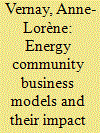

|
|
|
|
|
| Summary/Abstract |
The need to accelerate the decarbonisation of the energy system has led to renewed interest in energy communities. Such communities are now identified by institutions as new instruments that can contribute to four main policy objectives: i) increase renewable energy capacity, ii) mobilize private capital, iii) provide flexibility for the electricity system, and iv) empower consumers. Within the frame of the historically centralised French energy system, we present five energy community business models (ECBMs) and explore the extent to which they contribute to the four aforementioned policy objectives. Our analysis shows that, while no ECBM has yet enhanced the flexibility of the grid, each ECBM contributes differently to realising three other policy objectives. We also show that the diffusion of ECBMs remains limited as a result of legal, organisational and financial barriers. We propose three recommendations that could help ECBM diffuse – protect economic viability, support intermediaries that facilitate the adoption of ECBMs, and nurture local governments as key enablers. Our outcomes are intended to guide policymakers by providing insights into which types of energy communities could contribute most significantly to the various policy objectives and provide recommendations to include them in their energy policy roadmaps more effectively.
|
|
|
|
|
|
|
|
|
|
|
|
|
|
|
|
| 7 |
ID:
125578
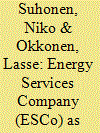

|
|
|
|
|
| Publication |
2013.
|
| Summary/Abstract |
Energy Services Companies are widely implemented for improving energy efficiency both in the public sector and industry. The model has also been introduced as a business model for biomass-based heat entrepreneurship. However, the residential sector has been problematic with regard to ESCo adoption and constitutes a minor share of ESCo operations. The barriers, both social and economic, are many. This paper focuses on the application of ESCo as a business model for heat entrepreneurship in Finland. First, we present the ESCo model and a review of the main barriers. Second, we present the modelling with aspects of profitability and risk sharing. Third, we demonstrate the operation in the residential sector by using 26 housing associations as a case study. We simulate the energy investment, profitability of operation, and the sharing of risks between the customer and the ESCo. The results indicate that the ESCo model is challenging in our case area. Low profit levels and the assumed customer's preference for achieving cost savings from the beginning of energy renovation can result in long contract periods tying up the capital. The ESCo model is unattractive in the current business climate, requiring modifications or integration with other maintenance services of housing associations.
|
|
|
|
|
|
|
|
|
|
|
|
|
|
|
|
| 8 |
ID:
166516
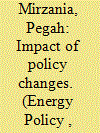

|
|
|
|
|
| Summary/Abstract |
The UK's energy system is predominantly centralised with a major reliance on fossil fuels. The trilemma of successfully delivering energy security, equity, and environmental sustainability, whilst dealing with an ageing energy infrastructure, demands change within the entire energy system. In recent years, Community Renewable Energy (CRE) projects have played a significant role in the transition of the UK's energy system, but since 2016 government support for them has been less robust. This paper reports a web-based survey and semi-structured interviews of the UK's community energy groups undertaken between August 2016 and March 2017. The results indicate that huge problems have arisen due to the changes in government policy, particularly for solar photovoltaic schemes. The majority of CRE organisations have chosen to focus on managing their existing assets rather than plan further growth. Additionally, this paper highlights the key challenges facing CRE projects that wish to develop innovative business models under the new policy conditions.
|
|
|
|
|
|
|
|
|
|
|
|
|
|
|
|
| 9 |
ID:
150704
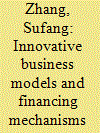

|
|
|
|
|
| Summary/Abstract |
The Chinese government has in recent years put in place a large number of incentive policies for distributed solar PV (DSPV). However, some of these policies have not been well performed due to many constraints, particularly the lack of innovative business models and financing mechanisms. This paper looks into this issue through the approach of combining literature review and interactive research, including interactions with managers from China's policy and commercial banks and PV projects. A comprehensive literature review on DSPV business models and financing mechanisms are firstly reviewed. Then the rapid evolving business models and financing mechanisms in the United States are examined, which provides some insights for China. Subsequent to this, the existing innovative business models and financing mechanisms for DSPV deployment in China and challenges facing them are discussed. Built on this discussion, policy recommendations are provided at the end of the paper. This study provides some insights for renewable energy policy makers in China as well as in other countries.
|
|
|
|
|
|
|
|
|
|
|
|
|
|
|
|
| 10 |
ID:
175252
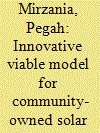

|
|
|
|
|
| Summary/Abstract |
The progressive withdrawal of the Feed-in-Tariff provided by the UK government has left community-owned solar photovoltaic projects facing significant financial challenges. They urgently need to develop alternative business models that will enable them to develop new projects and recuperate their costs in this post-subsidy era. One promising possibility is the incorporation of storage technology. However, currently it cannot be denied that the financial viability of this type of model is in question. This paper investigates whether and how integrated solar and battery storage system would be financially viable, using the System Advisor Model as a simulation tool to conduct techno-economic analyses.
|
|
|
|
|
|
|
|
|
|
|
|
|
|
|
|
| 11 |
ID:
115167


|
|
|
|
|
| Publication |
2012.
|
| Summary/Abstract |
Rural electrification (RE) has gained prominence over the past two decades as an effective means for improving living conditions. This growth has largely been driven by socio-economic and political imperatives to improve rural livelihood and by technological innovation. Based on a content analysis of 232 scholarly articles, the literature is categorized into four focal lenses: technology, institutional, viability and user-centric. We find that the first two dominate the RE debate. The viability lens has been used less frequently, whilst the user-centric lens began to engage scholars as late as 2007. We provide an overview of the technological, institutional and viability lenses, and elaborate upon the user-centric lens in greater detail. For energy policy and practice, we combine the four lenses to develop a business model framework that policy makers, practitioners and investors could use to assess RE projects or to design future rural electrification strategies.
|
|
|
|
|
|
|
|
|
|
|
|
|
|
|
|
| 12 |
ID:
103455


|
|
|
|
|
| Publication |
2011.
|
| Summary/Abstract |
Electricity storage is considered as a valuable source of flexibility with applications covering the whole electricity value chain. Most of the existing evaluation methods for electricity storage are conceived for one specific use of the storage, which often leads to the conclusion that the investment on storage does not pay off. However, the value of storage cannot be properly estimated without taking into account the possibility of aggregating the services that storage can offer to different actors. This paper proposes a new business model that allows aggregating multiple revenue streams of electricity storage in a systematic way. The model consists in coordinating a series of auctions in which the right to utilize the storage unit is auctioned upon different time horizons. In the mean time, non-conflicting usage of storage by the actors in these different auctions is ensured. The functioning of the model is demonstrated by a case study. The results show that a storage unit can achieve higher return on investment in the manner proposed in the business model.
|
|
|
|
|
|
|
|
|
|
|
|
|
|
|
|
| 13 |
ID:
186430
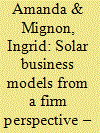

|
|
|
|
|
| Summary/Abstract |
A worldwide transition towards sustainable energy systems requires the diffusion of renewable electricity technologies. To achieve this, recent research has put emphasis on the role of business models as catalysts for sustainability transitions, particularly in the case of solar photovoltaics. Authors have identified a variety of solar business models that can be characterized based on roles, activities, and applications. In contrast, on the market, solar firms use business models to communicate their offer to clients, focusing on customers’ needs, how they organize their resources and activities to meet these needs and, in return, create value for themselves. The aim of this paper is to bridge the gap between the way energy policy literature describes solar business models, and the way solar firms use them to communicate with their clients. The business models of 241 solar firms in Sweden were mapped and analyzed using a framework developed by Richardson (2008) as well as the roles, activities, and applications as highlighted in solar business model literature. This led us to identify six types of solar business models. We found that there are some gaps and overlaps between theoretical and empirical solar business models which, in turn, have implications for theory and policy.
|
|
|
|
|
|
|
|
|
|
|
|
|
|
|
|
| 14 |
ID:
181424


|
|
|
|
|
| Summary/Abstract |
By offering to rent energy technologies, energy suppliers and other companies may tap into new market segments, allowing them to preserve or increase market shares. Because such rental services can help overcome capital-related and other barriers to energy efficiency, they may also contribute to achieving ambitious energy and climate targets. Yet, empirical analyses of renting energy technologies are scarce. Employing a large-scale discrete choice experiment among owner-occupiers in the United Kingdom, this study explores households' willingness-to-pay for renting compared to owning their new heating system. The findings obtained from mixed logit models suggest that, on average, participants strongly dislike renting compared to owning their new heating system, in particular owner-occupiers who are older than 70 years. However, about a third of the sample is estimated to prefer renting. On average, participants also value heating cost savings associated with energy-efficient heating systems and longer warranty periods. Finally, the paper discusses implications for policy-makers and for providers of heating system rental services.
|
|
|
|
|
|
|
|
|
|
|
|
|
|
|
|
|
|
|
|
|